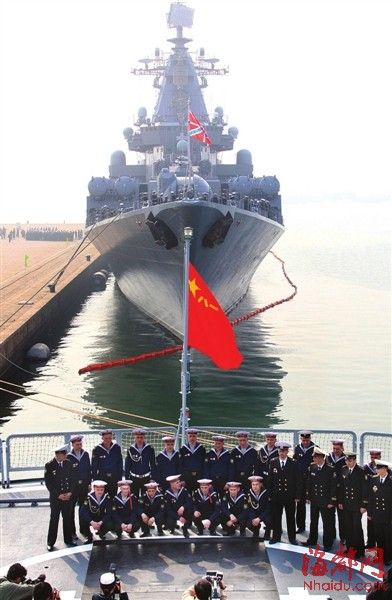China-Russia naval drill: who's the real target?
 0 Comment(s)
0 Comment(s) Print
Print E-mail China.org.cn, April 24, 2012
E-mail China.org.cn, April 24, 2012
Western media have wildly speculated as to who is the real target of the ongoing China-Russia joint navy drill which started on April 22 in the Yellow Sea off China's east coast. Some media have even gone so far as to claim that the drill's fabricated enemies are countries including the U.S. and Japan.
 |
|
Soldiers from the Russian Pacific Fleet's flagship Varyag pose for photos on a Chinese warship on April 22. |
According to Global Times, a newspaper under People's Daily, Western media believes the drill is targeted at countries which have sovereignty disputes with China. Most remarkably, the U.S. is the "culprit" whose recent overweening may lead China and Russia to form a military alliance.
However, experts believe it's unlikely that this situation will occur. A German military expert said that the two navies had decided to conduct the exercises last August, and other countries such as the U.S., Japan and South Korea also hold military drills in the Yellow Sea, even on a more frequent basis.
Germany-based TV news channel N24 said, except for anti-terrorism and anti-hijacking exercises, the drill is actually aimed at the U.S., the Philippines, Japan and other neighboring countries of China. Germany's Der Spiegel magazine claimed that the U.S. aggressive stance in the Asia-Pacific region will push China and Russia toward forging an alliance.
The drill triggered even stronger responses from the countries surrounding the Yellow Sea, especially Japan and South Korea. South Korea's Kookmin Ilbo newspaper stated in an editorial that the joint drill between China and Russia, though claimed not to be targeting South Korea, is exerting indirect impacts on the country as the drill indeed poses a military threat to the South Korea-U.S. Alliance, whose joint exercises received extreme opposition from China in the past.
Japan's Tokyo Shimbun, in an editorial published on April 22, commented that the China-Russia joint exercise is conducted in such a high profile manner, forming a sharp contrast with the one staged by the U.S. and the Philippines in the South China Sea off Palawan between April 16 and 27, as the latter two decided not to publicize the whole process to avoid irritating China.
Japan's Fuji Television Network explicitly pointed out that Japan and the U.S. have been branded as the fabricated enemies by China and Russia in their joint drill.
It is understood that Chinese submarines will play the blue side, an opposing force "attacking" the joint fleet, as part of the deployment is focused on anti-submarine tactics.
"China and Russia have made in-depth exchanges on tactics and tech for this joint drill," said Yin Zhuo, director of the Chinese PLA Navy's Information Technology Experts Committee. Yin introduced the exercises, include items considered highly confidential by any country's military forces, such as anti-submarine tactics, regional aerial defense and point defense missiles. "This shows that the drill between these two countries is held in a pragmatic manner."
Ding Yiping, deputy commander of the PLA Navy, said that the joint drill is beneficial for deepening the pragmatic cooperation between the two navies, and creates a good opportunity for them to learn from each other. It helps to test defensive capacity, and raise their capabilities in carrying out joint actions and collaboration.
The April 22-27 drill involves a total of 16 vessels and two submarines from the Chinese navy and four warships from the Russian navy's Pacific Fleet, as well as three supply ships being summoned for the exercise.
China and Russia have conducted several joint military exercises since 2005 within the framework of the Shanghai Cooperation Organization.
(The article was written in Chinese and translated by Zhang Junmian)






Go to Forum >>0 Comment(s)